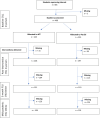The impact of mindfulness training in early adolescence on affective executive control, and on later mental health during the COVID-19 pandemic: a randomised controlled trial
- PMID: 35820991
- PMCID: PMC9340025
- DOI: 10.1136/ebmental-2022-300460
The impact of mindfulness training in early adolescence on affective executive control, and on later mental health during the COVID-19 pandemic: a randomised controlled trial
Abstract
Background: Previous research suggests that mindfulness training (MT) appears effective at improving mental health in young people. MT is proposed to work through improving executive control in affectively laden contexts. However, it is unclear whether MT improves such control in young people. MT appears to mitigate mental health difficulties during periods of stress, but any mitigating effects against COVID-related difficulties remain unexamined.
Objective: To evaluate whether MT (intervention) versus psychoeducation (Psy-Ed; control), implemented in after-school classes: (1) Improves affective executive control; and/or (2) Mitigates negative mental health impacts from the COVID-19 pandemic.
Methods: A parallel randomised controlled trial (RCT) was conducted (Registration: https://osf.io/d6y9q/; Funding: Wellcome (WT104908/Z/14/Z, WT107496/Z/15/Z)). 460 students aged 11-16 years were recruited and randomised 1:1 to either MT (N=235) or Psy-Ed (N=225) and assessed preintervention and postintervention on experimental tasks and self-report inventories of affective executive control. The RCT was then extended to evaluate protective functions of MT on mental health assessed after the first UK COVID-19 lockdown.
Findings: Results provided no evidence that the version of MT used here improved affective executive control after training or mitigated negative consequences on mental health of the COVID-19 pandemic relative to Psy-Ed. No adverse events were reported.
Conclusions: There is no evidence that MT improves affective control or downstream mental health of young people during stressful periods.
Clinical implications: We need to identify interventions that can enhance affective control and thereby young people's mental health.
Keywords: child & adolescent psychiatry.
© Author(s) (or their employer(s)) 2022. Re-use permitted under CC BY. Published by BMJ.
Conflict of interest statement
Competing interests: WK is the Director of the Oxford Mindfulness Centre and receives royalties for several books on mindfulness. JMGW is former Director of the Oxford Mindfulness Centre and receives royalties for several books on mindfulness.
Figures
References
Grants and funding
LinkOut - more resources
Full Text Sources

